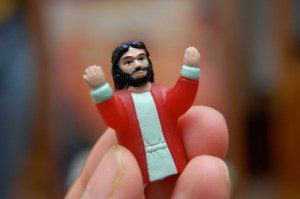This piece was originally published at The Christian Post on October 30, 2012.
 In North America, the Christian right and left tend to conceive the individual Christian as the focal point of political life. We have a hard time conceiving the visible church as a political community, bearing witness to the kingdom of God in Christ. The visible church is often viewed inside and outside the Christian community as a voluntary association of religious individuals. In such contexts, the church is a means to an end of a more foundational social allegiance, such as the state, market, or nuclear family.
In North America, the Christian right and left tend to conceive the individual Christian as the focal point of political life. We have a hard time conceiving the visible church as a political community, bearing witness to the kingdom of God in Christ. The visible church is often viewed inside and outside the Christian community as a voluntary association of religious individuals. In such contexts, the church is a means to an end of a more foundational social allegiance, such as the state, market, or nuclear family.
Of course, the state, market and nuclear family influence the life of the church in various ways. How can it be otherwise when the local church does not exist in a vacuum? While there is inevitably going to be influence, these respective institutions should never take the place of the church in terms of the Christian’s fundamental social allegiance. While the state and market certainly impact the visible church in terms of political and economic laws and trends, they do not dictate to the church its polity in our society. Moreover, the nuclear family certainly can and often does participate in the local church as part of a larger whole, but it must guard against reducing the local church to being a dispenser of religious programs and services for children and families that can be discarded as soon as a competing church down the street offers better programs and services; rather, the nuclear family members belong to the visible church as loyal members of the family of Christ with brothers and sisters who may or may not be members of nuclear families. The church exists as an extended spiritual family as well as a socio-political community, which serves Jesus Christ as Lord.
Now some may question the use of the terminology “voluntary association.” They may fear that what I am calling for is a state church. Hardly. I am simply challenging the consumer impulse noted above at the close of the previous paragraph: Christian nuclear families must guard against the impulse to shop around for the best religious family value package available in their midst. Our allegiance to the local church as individual Christians and religious nuclear families must be based on more than voluntary decisions based on passing whims and involuntary impulses and urges. Could we ever see ourselves switching nuclear family allegiances based on such whims and urges? Hopefully not. Nor should we do the same here.
The visible church also exists as a political community in that it serves one Lord, Jesus Christ. While we should vote for political candidates during election season and while we pick and choose particular goods in the market on a daily basis, we should see our fundamental social solidarity bound up with the kingdom of God in Christ who has bought us at the price of his own life; we belong to him. Without solidarity with one another, the church will not be able to be a compelling force of love for good, but will allow other publics to co-opt individual Christians for their competing narratives and visions of the future. While we may not always agree in our respective churches on various political issues and economic developments, we can and must agree at the very least on the following:
As the Christian community, we bear witness to the fact that government and the market do not compete with Jesus as Lord of our imaginations and hopes for the future, for our boast in where our security and power reside, and for our pocket books. Whenever the state or market challenge our fundamental loyalty and move to eclipse the biblical story with their own ‘sacred’ narratives, we must protest and refocus our vision.
As the Christian community, we are responsible for participating in our society in caring for the well-being of all people in our midst, citizens and non-citizens alike, especially the orphan and widow in their distress. The church knows no borders and must love every neighbor and guard against favoritism in any way.
As the Christian community, we are called to nurture a theology and ethic of life that is all-encompassing and that bears upon every sector of society, for Jesus is Lord of all life and every sphere.
Lastly, our protest as the church to the other public powers in view of Jesus as Lord must always be civil. We must also promote civility and call for effective governance in the family, state and market that safeguards human well-being in view of the fact that all people are created in God’s image and have inherent dignity and are equal.
We on the religious right and left must move beyond the wrong view of the Christian’s political life as an individual concern and effect maximal change for the betterment of society as the church in solidarity with one another in view of Jesus as Lord.
I explore these themes further in Exploring Ecclesiology: An Evangelical and Ecumenical Introduction, which I co-authored with Brad Harper. It is available wherever fine books are sold.












